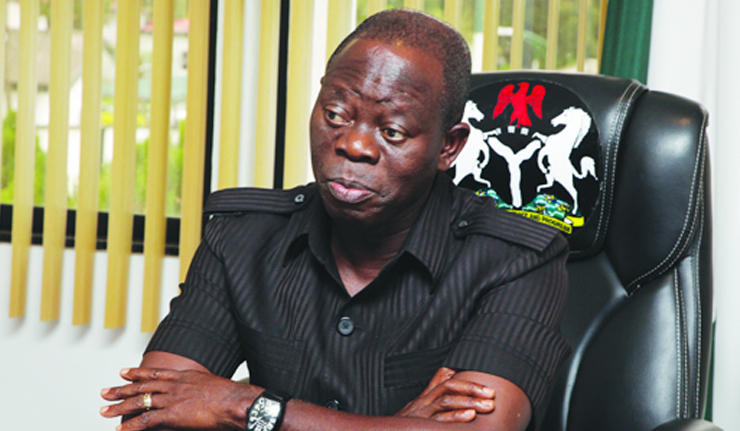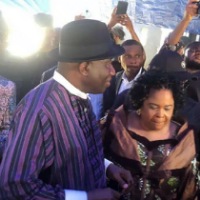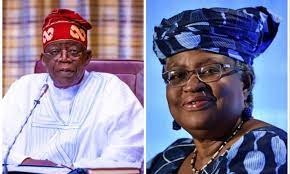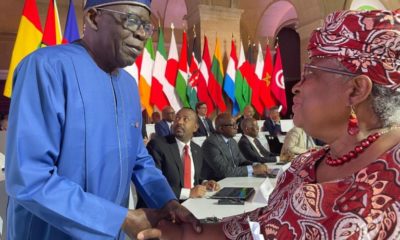Finance
Ex-Finance Minister released $1bn govt funds for Jonathan’s re-election – Oshiomhole

ABUJA-THE Edo State Governor, Adams Oshiomhole, has accused the former Minister of Finance and Coordinating Minister of the Economy, Dr. Ngozi Okonjo-Iweala, of tampering with $1bn from the Federation Account, which he claimed was used “for election purposes.”
But in a swift reaction, Okonjo-Iweala described the statement as a “ludicrously false statement that has unfortunately become a trademark of the Governor in his public campaign of falsehood.”
However, Oshiomhole, who disclosed this on Monday at a seminar organised by the state government for permanent secretaries, directors and deputy directors on enhancing internally generated revenue in the state, challenged the former minister to tell Nigerians how the Excess Crude Account was drawn down to $4.1bn from the peak of $10bn, when no approval was given by the National Economic Council for any withdrawals.
He also called for a forensic audit to determine the true amount which he said was illegally spent from the Federation Account under her watch as a minister.
The governor said, “The truth is, many things went wrong even at the federal level. As you might have read in the papers while the Federal Government, under Goodluck Jonathan, with the then Coordinating Minister of the Economy liked to blame ‘governors’ for wasteful spending; for not saving for the rainy day; for not investing properly, the truth is the real weakness in the Nigerian federal chain has been the Federal Government.
“Our hope is that with the new President, given his pedigree, we will break from the past. As I am sure you will soon begin to hear when all the numbers are published. Last week, I complained aloud that Edo State lost about N10bn over a four-year period from only one source – the NLNG remittance to the Federation Account.
“How did I arrive at the figure? I used my Four-Figure Table and I asked myself at $2.1bn remitted by NLNG, as taxes, and Shell. And by the way, Shell is not the only oil operative; we have Chevron and several others. They shared the $2.1bn based on the revenue allocation formula, Edo State got about N2.27bn. So I said, thank God this money came after the departure of Okonjo-Iweala and President Jonathan. If the PDP were still in charge in Abuja, this money would have been taken.
“That is not the only money Edo State Government has lost. You have heard of the last instalment of $4.1bn that was in the Excess Crude Account as of November, 2014, and from that time till today, we have not, when I say we– federal, states and local governments have not touched that money. We have not agreed to take anything out of it, and yet it has been drawn down to about $2bn, which means $2.1bn disappeared.
“But if you talk to those oil marketers, they will tell you that within that period, they were paid $1bn, not $2.1b. So in truth, about $1bn was taken for election purposes and Edo State’s share of that should have been about N4.6bn from that $2.1bn that Dr. Ngozi Okonjo-Iweala, the former Minister of Finance illegally took from Excess Crude account.
Oshiomhole added, “Governments have lost a lot of money and the $2.1bn, that is Edo State’s share of that, because that would have included derivation, we would have made about N2.6bn. That, we have lost now to Okonjo-Iweala. Now that she claimed she used it, between herself and the last President, they agreed to take the money to pay oil marketers.”
Meanwhile, Okonjo-Iweala on Monday night denied withdrawing the sum of $1bn from the Excess Crude Account to finance the campaign of former President Goodluck Jonathan.
In a statement issued by her Media Adviser, Mr. Paul Nwabuikwu, the former finance minister described the allegation by Governor Adams Oshiomhole of Edo State that she spent $1bn out of the ECA to fund the re-election bid of former President Jonathan as a “ludicrously false statement that has unfortunately become a trademark of the Governor in his public campaign of falsehood.”
The statement said the comment by the governor was “just another example of the numerical diarrhea that seems to have afflicted His Excellency in recent times in his effort to damage the reputation of the former Minister.”
It read in part, “He has, within the last few months, asked Okonjo-Iweala to explain all kinds of totally wild and unsubstantiated figures, ranging from $30bn, $20bn, $2.1bn, N720bn and now $1bn.
“To say the obvious, the accusations are totally lacking in credibility. Governor Oshiomhole’s published comments also contain other falsehoods.”
“Dr Okonjo-Iweala never said the Federation Accounts Allocation Committee approved spending out of the ECA. Rather as the commissioners themselves stated, the former Minister of State Finance informed them that former President Jonathan approved the expenditure to end the debilitating fuel queues across the country.”
Business
Nigeria pays US$4.9 billion on petrol subsidy in 2024- NNPCL
It was however noted by Biztellers.com.ng, that although subsidy is back in effect, the main reason for that is the increasingly weak state of the Naira and the country’s extreme dependence on products importation. Also unlike the previous subsidy era, where several oil marketers were getting free subsidy refunds for unverified product importation, this subsidy era is witnessing only one importer, the NNPCL, which in effect is the sole receiver of government subsidies.
Yemie ADEOYE
INSPITE of the official position of the Nigerian government that the controversial petrol subsidy is gone for good as announced by the President on assumption of office, the state owned Nigerian National Petroleum Corporation Limited, NNPCL has disclosed that petrol subsidy is still fully operational in Nigeria, although, under a different identity.
Umar Ajiya, Chief Financial Officer at the NNPCL, disclosed that it cost the company a staggering N7.8 trillion (US$4.9) to cover this price gap in the first seven months of 2024.
Rather than simply referring to these claims as subsidies, he stated that the company is merely managing the price difference in petrol imports on behalf of the federation, stressing that this should not be misconstrued as a return to subsidy payments.
![]() This revelation has reignited discussions on whether the NNPC is indirectly offering subsidies, a concept typically defined as selling a product below its cost price.
This revelation has reignited discussions on whether the NNPC is indirectly offering subsidies, a concept typically defined as selling a product below its cost price.
Documents reviewed by Biztellers.com.ng showed that the term “subsidy” was used extensively in official correspondence between the NNPCL and the presidency, particularly in reference to the “shortfall.”
Recall that President Bola Tinubu reportedly approved NNPC’s request to utilize the 2023 final dividends due to the federation to offset these costs.
However, during a media briefing on Monday about the company’s 2023 audited financial statements, Ajiya refuted claims that the NNPC is involved in any subsidy scheme.
Ajiya further disclosed that the Nigerian government owes the NNPC N7.8 trillion ($4.9 billion) in subsidy-related debts for the period from January to July 2024.
In furtherance of his clarification to the News Agency of Nigeria (NAN), Ajiya insisted that no subsidy payments have been made to any marketer in the last nine years, citing the NNPC’s role as the sole importer of petrol under supply contracts.
He said, “In the last eight to nine years, NNPC Ltd. has not paid anyone a dime as a subsidy; no kobo has been disbursed by NNPC Ltd. in the name of subsidy. No marketer has received any payment from us for subsidy.”
“What has been happening is that we have been importing PMS, which has been landing at a specific cost price, and the government tells us to sell it at half price. So the difference between the landing price and that half price is a shortfall.
“And the deal is between the Federation and NNPC Ltd., to reconcile, sometimes they give us money, so there is no money exchanging hands with any marketer in the name of subsidy.”
Ajiya remained silent on how much of the $4.9 billion could have been remitted to the federation account if the NNPC had not been covering the “shortfall.”
It was however noted by Biztellers.com.ng, that although subsidy is back in effect, the main reason for that is the increasingly weak state of the Naira and the country’s extreme dependence on products importation. Also unlike the previous subsidy era, where several oil marketers were getting free subsidy refunds for unverified product importation, this subsidy era is witnessing only one importer, the NNPCL, which in effect is the sole receiver of government subsidies.
Banking
CBN Denies Currency Devaluation

The Central Bank of Nigeria (CBN) has refuted claims of devaluing the.
Earlier reports suggested that the CBN had devalued the Naira, lowering its exchange rate from N631 to the dollar, compared to the previous day’s rate of N461.60 at the Importers and Exporters (I&E) window.
However, the Central Bank of Nigeria (CBN) released a statement on Thursday through its Acting Head of Corporate Communications, Dr. Isa Abdulmumin, categorizing the report as false information.
In the statement titled ‘CBN Has Not Devalued The Naira’, he said the attention of the apex bank was drawn to the news report by an Abuja based newspaper edition of June 1, 2023, titled “CB Devalues Naira To 630/51”.
However, the CBN stated categorically that the news report was replete with outright FALSEHOODS and destabilizing innuendos, ‘reflecting potentially willful ignorance of the said medium as to the workings of the Nigerian Foreign Exchange Market.’
“For the avoidance of doubt, the exchange rate at the Investors’ & Exporters (I&E) window traded this morning (June 1, 2023) at N465/USS1 and has been stable around this rate for a while.
“The public is hereby advised to ignore the news report by Daily Trust in its entirety, as it is speculative and calculated at causing panic in the market,” the CBN spokesman added.
He, therefore, advised media practitioners to verify their facts from the Central Bank of Nigeria before publishing in order not to misinform the public.
Banking
BREAKING: CBN Increases Interest Rate By 0.5%

The interest rate in Nigeria has been raised to 18.5 percent, up by 0.5 percent, from 18 percent where it was pegged in March 2023.
The Central Banks of Nigeria’s (CBN) Monetary Policy Committee (MPC) resolved to this effect at its third meeting of 2023 in Abuja, on Wednesday.
Governor, CBN, Godwin Emefiele, made the disclosure in the communiqué of the MPC’s meeting, thereafter.
While engaging the media at the end of the two-day meeting, Emefiele, said the committee voted to keep the asymmetric corridor at +100 and -700 basis points around the MPR.
In the view of the MPC, rising inflation rate is traceable to the high energy cost and challenges around the supply chain, among others, which lie outside the corridors of the CBN.
Emefiele said, “The current trend in price development would continue to be monitored by the bank with greater collaboration with fiscal authority to address the drivers of inflation.”
Biztellers reports that the CBN had effected six consecutive interest rate increases, which has seen the rate move from 11.5 percent in March 2022 to 18.5 percent in May 2023.






















